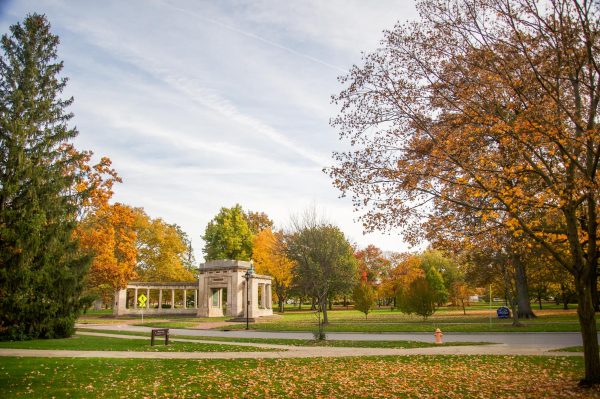Oberlin Must Improve Arabic Program
I have wanted to study Arabic since middle school. When I came to Oberlin, I was thrilled to finally get the opportunity. Two years in, it feels like the work my classmates and I put in is finally paying off. In this past semester, we have expanded our vocabularies to move beyond our initial discussions of menus, taxicabs, and passports and are finally making our first, clumsy steps into meaningful conversation.
I was therefore deeply disappointed when I found out that no Arabic classes would be offered beyond the 200-level. Oberlin only employs one Arabic instructor — Basem Al-Raba’a, a visiting assistant professor — and a 300-level class would exceed his course load. Last semester, he suggested that we might continue our studies through a shared classroom experience, in which we would learn Arabic via videoconference with a class at Denison University. However, this plan ultimately fell through, leaving my classmates and me with few options going forward.
The only way to continue our studies is through private readings, but this is not a sustainable solution. For one thing, it is not fair to the instructor. Professor Al-Raba’a explained that, between private readings and regular classes, he “generally … teach[es] more than [his] workload,” and sacrifices time that he could otherwise spend on research. Yet even with this extra uncompensated labor, he is unable to meet student demand. “Some other students who finished their second year [of Arabic] emailed me for private readings,” he said, “but I couldn’t because of my workload. So there is definitely an interest on the part of the students. … I can’t meet all this interest.”
While building up a more robust shared classroom program would be a step in the right direction, Oberlin can best meet student demand by hiring another Arabic professor. Of course, given our school’s financial difficulties and the looming austerity measures, this is easier said than done. Many departments and programs need additional resources. Yet when one considers Arabic in the context of Oberlin’s other language departments, it seems only reasonable that we should have at least two instructors.
Next semester, according to our Fall 2018 course schedule, Oberlin will have several instructors offering language courses — three French instructors, four German instructors, four Russian instructors, and two Latin instructors. These exclude Honors projects and private readings. They also exclude those instructors simply listed as “staff.” What’s more, none of these languages have as many native speakers as Arabic does. The prioritization of these less widely spoken languages shows a Western bias that is contrary to the diversity standard of Oberlin’s curriculum. The College does teach a few non-Western-centric languages such as Japanese at a 300-level, but there is still an overall imbalance. We would hope to see Arabic treated with the same degree of respect as French.
There are many reasons students want to learn Arabic. It has hundreds of millions of native speakers worldwide and a rich cultural and historical legacy. It’s also rising as one of the most widely spoken languages in the U.S. For some students, it provides a link to their roots. “There are students who want to study Arabic to connect with their relatives and families abroad,” Al-Raba’a said.
Al-Raba’a also pointed out that some of his students want to work in the Middle East, stressing that the department is “extremely essential” for them. The limitations of our Arabic program present a significant barrier to these students’ goals. “I want to go into human rights work in the Middle East,” said Middle East and North Africa major Leo Hochberg. “If I can’t achieve proficiency by the time I leave Oberlin, I won’t be able to get any jobs. I may have to transfer because of this issue.”
Arabic has many and varied interdisciplinary connections. Given the current state of the world, Arabic is profoundly relevant to two of Oberlin’s most popular majors, Politics and Environmental Studies. As the language of one of the most influential religious texts in existence, it is essential to the Religion major. The language’s unique dialectical variations make it a particular point of interest for linguists and anthropologists. Furthermore, the rapid growth of Oberlin’s Middle East and North Africa program over the past few years reveals our student body’s interest in the Arabic-speaking world.
Students will only be able to make these connections in their majors if we get the chance to properly learn the language, however. Arabic is grammatically and phonetically complex, and it differs greatly from English. The U.S. Foreign Service Institute classifies it as among the hardest languages for native English speakers to learn. Based on my experience as a student, two years is not nearly enough time. According to Professor Al-Raba’a, it takes students four or five years to speak fluently, and three years to be able to “live in the Middle East and just function using the language that they know.”
As a school that values inclusion, Oberlin should do justice to the richness and complexity of the Arabic language. This will only be possible with at least two professors.




